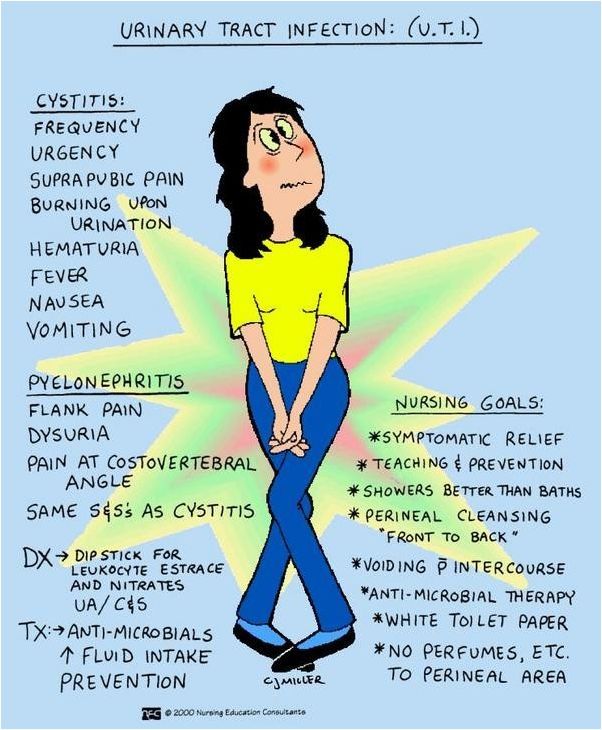Treatment Concerns For Antibiotics
While most UTIs can be effectively managed and treated with a course of antibiotics, more and more bacteria are becoming resistant to different types of antibiotics due to mutations in their genetic code. Every time you take an antibiotic, the bacteria that are in your system are more likely to adapt and mutate and become resistant to the administered antibiotic. And since recurrence rates in the case of UTIs are high, its a strong possibility that an antibiotic may not be effective every time. Many antibiotics such as ampicillin, amoxicillin, and sulfonamides are no longer effective against stronger mutated bacteria and hence are not a good choice for combatting these infections.
Other health risks and adverse effects associated with antibiotics for the treatment of urinary tract infections include extreme allergic reactions and numerous side effects. These can include:
- Nausea and vomiting
Another potential risk of taking antibiotics is that they might destroy some of the good bacteria residing in your system that help with your systematic bodily functions without harming you. The death of these bacteria opens up the passageway to a whole new range of possible infections.
Antibiotics That Shouldn’t Be A First Choice For Uncomplicated Utis
Other antibiotics appear to be overused, and some physicians may misuse non-recommended antibiotics as first-line treatments. Ciprofloxacin is used in 35% of uncomplicated UTIs, while levofloxacin is used in 2%. These antibiotics can be important treatments in some cases of more complicated UTIs, but can have dangerous side effects.
The U.S. Food and Drug Administration warns that the use of these drugs should be restricted because of their potentially disabling side effects involving tendons, muscles, joints, nerves and the central nervous system. Additionally, in many parts of the country, bacteria commonly causing UTIs are becoming resistant to these antibiotics.
Get Your Prescription Filled Right Away
Once you are done with your appointment and have received a prescription for an antibiotic, its important you get it filled at a pharmacy as soon as possible. The faster you start taking your medication, the faster your UTI will be gone.
If you usually use next-day prescription delivery or a mail order pharmacy, this is one time when you should avoid doing this. These options can cause a delay by anywhere from 1 day to 1 week . Youre better off using a local pharmacy in this case.
If going into the pharmacy is a concern due to COVID-19, many pharmacies have added options to help minimize the amount of time you are inside the building. Some options to ask about at your pharmacy include:
-
Same-day delivery through services like Instacart
-
Using the pharmacys drive-thru pick-up window
-
Curbside pick-up
-
Paying ahead of time through the pharmacys smartphone app to make your time spent at the checkout counter faster
Every pharmacy is different, so make sure to ask your personal pharmacy if these options are available at your location.
Also Check: How To Train Bladder To Hold More Urine
You May Like: Best Otc Yeast Infection Meds
Add Vitamin C To Your Diet
Not only does vitamin C help strengthen your immune system, but it may also acidify your urine, which limits the growth of some bacteria and may prevent urinary tract infections from occurring. Just be careful of eating too many acidic foods when you have a UTI, as they can potentially irritate your bladder, which may only make your UTI symptoms worse.
Recommended Reading: Bladder Infection Spread To Kidneys
Do Urinary Tract Infections Hurt

Asked by: Samantha Konopelski
A UTI can involve any part of your urinary system, including the urethra, ureters, bladder and kidneys. Symptoms typically include needing to urinate often, having pain when urinating and feeling pain in your side or lower back. Most UTIs can be treated with an antibiotic.
Don’t Miss: Topical Antifungal For Yeast Infection
The Need For Nonantibiotic Management
The armamentarium of effective antibiotics is rapidly diminishing, and the size of this problem cannot be overstated. Resistance to amoxicillin is now 100% among urinary isolates of E. coli in some countries in Africa, and high levels of resistance to many commonly prescribed antibiotics have been identified worldwide. Resistant strains of E. coli, such as ST131 , are associated with outbreaks of UTI, and the widespread emergence and spread of carbapenem-resistant Enterobacteriaceae is a global public health threat,. Transmissible resistance in Enterobacteriaceae is now emerging against colistin with the potential to rapidly spread. This development means that our drug of last resort for treating infections caused by multidrug-resistant Gram-negative bacteria is failing, and infection with these multidrug-resistant strains might, therefore, be untreatable with currently available antibiotics.
Fig. 2: Mechanisms of antimicrobial resistance by mobile genetic elements.
We are facing a future in which combination therapy for UTI treatment will be routine, as resistance rates to single agents rise to unacceptable levels worldwide and untreatable UTIs present a real concern. This problem is exacerbated by the overuse of antibiotics, both in humans and in veterinary medicine. To control this crisis in antimicrobial resistance, nonantibiotic approaches are crucial in providing a means of reducing symptoms without resorting to antibiotic use.
Uti Tests And Diagnosis
If you suspect that you have a urinary tract infection, go to the doctor. Youll give a urine sample to test for UTI-causing bacteria.
If you get frequent UTIs and your doctor suspects a problem in your urinary tract, they might take a closer look with an ultrasound, a CT scan, or an MRI scan. They might also use a long, flexible tube called a cystoscope to look inside your urethra and bladder.
You May Like: Antibiotics For Sinus Infection And Ear Infection
Urinary Tract Infections: Causes Symptoms And Treatment
Various types of urinary tract infections affect people around the world, but adult women suffer the most from its most common formcystitiswhich affects the bladder. In the United States, approximately 25 to 40 percent of women have had at least one urinary tract infection. Men and children also develop urinary tract infections, but in fewer numbers.Here are the causes and symptoms of UTIs along with treatment options.
Things Women Need To Know About Utis
May 12, 2016
If youve ever had a urinary tract infection and if youre a woman, chances are you have you know theyre not fun. UTIs not only feature unpleasant symptoms, like an increased urge to urinate and a burning sensation when you do, but also a tendency to come back again and again. In fact, UTIs are the second most common type of infection in the body, leading to over 8 million visits to health care providers each year.1
Because urinary tract infections are also one of the most common conditions treated by MDLIVE doctors, we decided to speak to Dr. David Talbott, MDLIVEs VP of Physician Education and Quality Assurance, to find out what we should know.
Also Check: How To Treat Ear Nose And Throat Infection
Urgent Advice: Ask For An Urgent Gp Appointment Or Get Help From Nhs 111 If:
You think you, your child or someone you care for may have a urinary tract infection and:
- a very high temperature, or feeling hot and shivery
- a very low temperature below 36C
- are confused, drowsy or have difficulty speaking
- have not been for a pee all day
- have pain in the lower tummy or in the back, just under the ribs
- can see blood in their pee
These symptoms could mean you have a kidney infection, which can be serious if it’s not treated as it could cause .
You can call 111 or get help from 111 online.
Can Antibiotics Resolve Utis
Most of the times urinary tract infections are not serious, but if they are not treated properly, then the infection can spread in your blood and kidneys and can be life-threatening. Kidney infections can lead to kidney damage.
Usually the symptoms of UTI improve after two to three days of being on antibiotics. However, minor or uncomplicated UTIs can be resolved on their own or with the help of home remedies, but the complicated and more serious UTIs need medical treatment. Such UTIs involve changes in the urinary tract like reduced flow of urine or swollen prostate, bacteria species that are resistant to antibiotics or conditions affecting immune system like lupus, HIV or cardiac disease.
Antibiotics are the standard and effective treatment for UTIs. Antibiotics kill the bacteria causing the UTI. Most of the UTIs occur when bacteria gets into the urinary tract from outside your body. Some of the species of bacteria that cause UTIs are
- E. coli species of bacteria that are most of the times responsible for most of the infections.
- Staphylococcus epidermidis
Recommended Reading: Reduce Swelling From Tooth Infection
Uti Treatment Without Antibiotics Is It Possible
In some cases, it is possible to treat urinary tract infections without the use of antibiotics. However, natural home remedies to treat UTIs must be used at the first sign of an infection to prevent the infection from developing.
According to OB/GYN Dr. Nivin Todd, the majority of UTIs are easy to treat and rarely produce complications. However, if the infection becomes more serious or has other complications, a course of antibiotics may be needed. This could happen if you have recurring UTIs, suffer from diabetes or have some kind of kidney damage.5
Also, treatments for women who are pregnant usually include antibiotics to prevent long-term health risks.
Because of the increase in resistance to antibiotics, many doctors recommend preventative measures to treat UTIs. For example, the journal Open Forum Infectious Diseases published a study on how to lower the need for antibiotics when treating UTIs. It was found that women who increased daily fluid intake by 1.5 L had a 50% lower risk of developing another UTI.6
A report published in the journal Current Infectious Disease Reports found that treating uncomplicated UTIs without antibiotics is often the best course.
Increasing your fluid intake, using the bathroom regularly, and taking probiotics can all help to treat simple UTIs without antibiotics.
Researchers recommended that antibiotics should only be used if the urinary infection doesnt clear up within 3 days.7
Antibiotic Warnings And Treatment Concerns

The most commonly prescribed antibiotics for uncomplicated UTIs are similar in efficacy. But its important to note that ampicillin, amoxicillin, and sulfonamides are no longer the drugs of choice for combatting UTIs because of the emergence of antibiotic resistance. In addition, amoxicillin and clavulanate has been shown in previous research to be significantly less effective than others when it comes to treating urinary tract infections.
Also, as noted above, the FDA advises against using fluoroquinolones for uncomplicated UTIs. These medicines should only be considered if no other treatment options are available. In some cases, such as a complicated UTI or kidney infection, a healthcare provider may decide that a fluoroquinolone medicine is the best option, notes the American Academy of Family Physicians.
For pregnant women, some common antibiotics, such as fluoroquinolones and tetracyclines, should not be prescribed because of possible toxic effects on the fetus. But oral nitrofurantoin and cephalexin are considered good antibiotic choices for pregnant women with asymptomatic bacteriuria and acute cystitis, according to past research.
Recommended Reading: Yeast Infection Pill Fluconazole Side Effects
A Simple Sugar Solution:
D-mannose is a naturally occurring sugar found in certain plants, including cranberries. You can buy D-mannose as supplements or in powder form.
As D-mannose travels through the body, it connects with substances that shouldnt be there, like infection-causing bacteria , and sweeps them out.
Individuals who suffer from recurrent UTIs can take a daily dose of one teaspoon of D-mannose for prevention. If you feel a UTI coming on, increase the dosage to one teaspoon every few hours.
Simply mix the D-mannose powder in water and drink. If youre concerned about blood-sugar levels, dont worry. Only a small amount of D-mannose is absorbed by the body, so it wont raise your blood-sugar levels.
Recommended Reading: Bard Latex Free Urinary Drainage Bag
Can A Urinary Infection Be Treated Without Antibiotics
Antibiotics are the most effective treatment for urinary infections. However, often, the body is able to resolve minor and uncomplicated urinary infections by itself without the need for antibiotics.
Nearly 25 to 42 percent of mild urinary infections tend to get better on their own. In these cases, people often try a variety of home remedies to speed up the recovery process.
However, in cases of severe or complicated urinary infections, you will need to seek medical treatment. These types of urinary infections usually involve one or more of the following factors:
- Changes in the urinary tract or other organs, such as a reduced flow of urine or an inflamed prostate
- They are caused by a species of bacteria that are resistant to antibiotics
- Complications are likely to arise if you have a medical condition that affects y our immune system, such as lupus, HIV/AIDS, or cardiac disease
Also Check: Will Prednisone Help With Ear Infection
What Is The Dosage Of Nitrofurantoin Vs Cephalexin
Nitrofurantoin
- The recommended adult dose for treating urinary tract infections is 50-100 mg 4 times daily or 100 mg every 12 hours for 7 days or for 3 days after obtaining sterile urine.
- Nitrofurantoin can be taken with or without meals. Taking it with meals increases its absorption into the body.
- The suspension can be mixed with water, milk, juice, or infant formula.
- It also is used once a day to prevent urinary tract infections.
- It should not be used in persons with poor kidney function.
Cephalexin
From Garden To Medicine Chest:
Asparagus extract supplements are another option. When it was tested against 18 different strains of bacteria, asparagus demonstrated strong anti-bacterial properties. And a second study showed that asparagus extract relieved inflammation, like the kind caused by a UTI.
So even though there are no studies testing its effectiveness specifically on UTIs, asparagus extracts have worked so well for my patients that they rave about its ability to ease symptoms.
Finally, to prevent re-infections, drink plenty of fresh, filtered water throughout the day to flush bacteria from your urinary tract.
Even better, add ½ cup unsweetened cranberry juice to 32 ounces of pure water, and drink throughout the day. Itll provide a steady supply of bacteria-fighting substances to prevent recurrences.
One caution: If you use D-Mannose or cranberry juice for several days and the UTI symptoms dont go away, see your physician to determine if the infection could be caused by something other than bacteria.
Untreated, UTIs can turn into a lethal blood infection known as sepsis. So please dont ignore these symptoms.
August 2, 2021Originally Published: August 13, 2014
Read Also: How To Speed Up Yeast Infection Recovery
Take Probiotics And Vitamin C Supplements
Probiotics and vitamin C may help flush bacteria from the urinary tract to clear away UTIs. Probiotics contain healthy live bacteria that can destroy bad bacteria, while vitamin C can strengthen your immune system to fight disease and infection. Ask your doctor for recommendations on the best probiotics and vitamin C supplements you can take to make your UTI go away on its own.
Keep in mind that while youre trying to clear a UTI on your own, you may still experience symptoms. Symptoms of a UTI include:
- A strong urge to urinate
- A persistent need to urinate
- A burning sensation when urinating
- Pink, red, or dark urine
- Urine with a strong odor
- Passing small amounts of urine
What If I Have Frequent Recurring Utis
Within a year of havig a UTI infection, roughy one-quarter to one-half of women will have another UTI. For these women antibiotic prophylaxis may be recommended by her health care provider. With a recurrent course of UTIs, a urine culture or imaging tests may be required for further analysis.
For recurrent UTIs, there are several antibiotic options for prevention:
- A shorter course of antibiotics at the first sign of UTI symptoms a prescription may be given to you to keep at home.
- A longer course of low-dose antibiotic therapy.
- Take a single dose of an antibiotic after sexual intercourse.
The choice of antibiotic is based on previous UTIs, effectiveness, and patient-specific factors such as allergies and cost. Antibiotics commonly used for recurrent UTIs can include sulfamethoxazole-trimethoprim, nitrofurantoin, cefaclor, or cephalexin.
In postmenopausal women with vaginal dryness that may be leading to recurrent UTIs, vaginal estrogen may be an effective treatment. Treatment options your doctor might recommend include: Estring, Vagifem , or vaginal estrogen creams .
You May Like: Steroid Pack For Sinus Infection
How Long Does A Uti Last: With Antibiotics Without Antibiotics Untreated Flush Fast
Is there ways on how to get rid of a UTI without going to the doctor? Urinary tract infection can create a lot of discomforts and that is the reason why many patients suffering from it would like to have got it rid very fast. Therefore get more insight on how long does a UTI last after using medicines and some of the ways to get rid of it fast.
You May Like: How To Treat Antibiotic Resistant Bacteria
Treating Urinary Infections Without Antibiotics

Urinary tract infections are typically caused by bacteria, which is why the standard treatment is to prescribe a course of antibiotics. However, is it also possible to treat urinary tract infections without antibiotics? Urinary tract infections are the most common bacterial infections observed in any country. In fact, nearly 50 percent of all women will end up catching a urinary tract infection at some point during their lifetime. These infections also tend to reoccur. Due to the high prevalence of such types of infections, many people often wonder if there are any non-antibiotic treatments to treat these infections. Read on to find out about how to treat urinary infections without antibiotics.
Also Check: Peroxide In Ear For Ear Infection